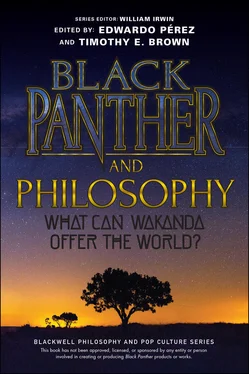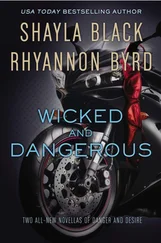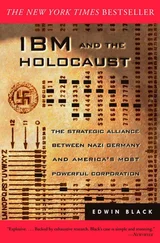Black Panther and Philosophy
Здесь есть возможность читать онлайн «Black Panther and Philosophy» — ознакомительный отрывок электронной книги совершенно бесплатно, а после прочтения отрывка купить полную версию. В некоторых случаях можно слушать аудио, скачать через торрент в формате fb2 и присутствует краткое содержание. Жанр: unrecognised, на английском языке. Описание произведения, (предисловие) а так же отзывы посетителей доступны на портале библиотеки ЛибКат.
- Название:Black Panther and Philosophy
- Автор:
- Жанр:
- Год:неизвестен
- ISBN:нет данных
- Рейтинг книги:4 / 5. Голосов: 1
-
Избранное:Добавить в избранное
- Отзывы:
-
Ваша оценка:
- 80
- 1
- 2
- 3
- 4
- 5
Black Panther and Philosophy: краткое содержание, описание и аннотация
Предлагаем к чтению аннотацию, описание, краткое содержание или предисловие (зависит от того, что написал сам автор книги «Black Panther and Philosophy»). Если вы не нашли необходимую информацию о книге — напишите в комментариях, мы постараемся отыскать её.
Black Panther and Philosophy: What Can Wakanda Offer The World
Black Panther
Black Panther and Philosophy
Black Panther and Philosophy — читать онлайн ознакомительный отрывок
Ниже представлен текст книги, разбитый по страницам. Система сохранения места последней прочитанной страницы, позволяет с удобством читать онлайн бесплатно книгу «Black Panther and Philosophy», без необходимости каждый раз заново искать на чём Вы остановились. Поставьте закладку, и сможете в любой момент перейти на страницу, на которой закончили чтение.
Интервал:
Закладка:
Justice and Reparation
Killmonger’s deep-seated anger toward the Wakandan government didn’t arise out of nowhere. He’s angry because they treated him unjustly. In the film, they abandoned him in a foreign country after accidentally killing his father. In the comics, his motivations are more fluid – different writers portray him differently – but there’s one constant: he never picks Wakanda at random. His motherland always does him wrong.
Locke would say we’re now facing two questions of justice. Like Kant, he wrote on retributive justice, but Locke says there’s also a second brand of justice, reparatory justice (sometimes called rectificatory justice ), which asks, if someone does you wrong, what do they owe you to make it right? Locke’s vision of justice was pretty radical in his day, because he thought monarchy was inherently unjust. Instead, he said we have certain natural rights – rights born into us by our very nature – which dictate that “no one ought to harm another in his life, health, liberty or possessions.” 7If you’re minding your own business and someone harms you in any of these categories, Locke says the offender owes you reparations. 8
John Locke has a presence in the world of Black Panther. The Wakandan philosopher Changamire quotes him in the 12-issue run “A Nation Under Our Feet,” by Ta-Nehisi Coates and Brian Stelfreeze. There, a rebel group called The People, inspired by Changamire’s vision of a Wakanda ruled by its people instead of its monarch, rises up to overthrow the Black Panther once and for all. Their motto, “No One Man,” is Lockean at heart. 9
For Coates, Wakanda is an allegory for the United States, and his questions of reparatory justice apply to both countries. Before he came to write for Marvel comics, Coates was a national correspondent for The Atlantic , where he made waves nationwide with his article, “The Case for Reparations.” There he asked a question that makes lots of Americans uncomfortable: what does the United States owe African Americans for the harm its policies have done to them?
It’s not an easy question to answer, in part because reparatory justice is tricky. Sometimes making reparations is easy, like paying someone’s bill from the body shop if you rear-end their car. Sometimes it’s difficult, like paying that bill when it costs as much as the vacation you’ve been saving up for all year. And sometimes it’s just plain impossible. For all its technological marvels, Wakanda can’t un-kill N’Jadaka’s father. (Maybe in Black Panther 2 T’Challa will borrow the Time Stone and go back in time to make things right. And hey, Marvel Studios, if that’s the way you decide to go with it, we want a cut.) The United States can’t un-exploit anyone, and even if it revoked every exploitative law on the books today, there are still millions of African Americans living with the everyday consequences of past exploitation. 10
The trickiest part of reparatory justice is dealing with powerful people who owe reparations but can’t be forced to pay – or, for that matter, to even consider what payment might look like. As Coates observes, the US government has shown no interest in even raising the question of reparations: no president has ever asked for a study, and the House of Representatives has turned down every opportunity to study the question. It has done this regardless of which party was in power, and it’s done it 26 times in a row. 11
In the film Black Panther , reparations are tricky for a different reason: Killmonger wronged Wakanda because Wakanda wronged him first. Had T’Chaka not orphaned and abandoned him, young N’Jadaka might never have become Killmonger. He might still have challenged T’Challa at Warrior Falls, as is every Wakandan citizen’s right, but he wouldn’t have had to murder anyone along the way. As he sees it, he’s taking by force the very thing Wakanda owes him anyway. But as the Wakandan government sees it, he’s setting the country on a course that can only end in violence and destruction. That’s no way to bring about justice.
However, what if there were a way to bring Killmonger and Wakanda to the table to discuss how to repair the damage done? What if that table included seats for everyone harmed by either party? In other words, instead of asking how to punish or how to repay debts, what if the question of justice were how to make things better for everyone involved?
Justice and Restoration
Changamire offers a vision for how to do this. In the wake of the violence and rebellion in “A Nation Under Our Feet,” Changamire says, “Restoration is what is needed now. Restoration for our country.” 12He gathers not just the powers that be (T’Challa the king and Aneka the rebel leader) but also ordinary citizens traumatized by the war, so that together they can navigate a path forward. Their interest is not retribution or reparation, but rather restorative justice .
Criminologist Howard Zehr says we can distinguish retributive justice from restorative justice by looking at how they understand crime, criminals, and victims. Retributive justice defines crime as a violation of laws, and therefore sees the state itself as the victim of crime. Restorative justice, on the other hand, defines crime in terms of harm – not in the abstract sense as an offense to the state, but harm to real people and real-world relationships. In retributive justice, criminals are law-breakers by definition and therefore deserve punishment. In restorative justice, criminals count among the people harmed by injustice. Restorative justice reminds us that people can be wrongdoers and victims at the same time, and it recognizes that oftentimes it’s because people are hurt that they hurt others. 13Concerned with identifying the root causes of injustice, restorative justice wants to figure out who’s a stakeholder in the situation, and then involve all the stakeholders collectively in setting things right.
Because retribution has to do with what people deserve, not what people need, you can do retributive justice without asking any questions about political power or social position. That’s not possible with restorative justice. If you want to restore a community that’s been torn apart, you can’t ignore the fact that some people are more powerful than others. You have to acknowledge things like racism and sexism. And you can’t pretend people are just one thing: every criminal is also someone’s child, someone’s neighbor, maybe someone’s employee or employer, maybe a parent or caretaker.
In fact, most of us are technically criminals. (How many laws have you broken?) Think about how your community would react to losing you. Sending someone to prison doesn’t punish one person; it creates a hole in society, a hole other people have to step in to fill. Put enough people in prison and entire communities can collapse. That’s not justice. From the standpoint of restorative justice, it’s another form of harm, this time inflicted by the state. So, when Killmonger wakes up handcuffed to a hospital bed, restorative justice would have T’Challa say, “You’re no use to us locked up. How are we going to work together to heal all the damage we’ve caused?”
Sending Killmonger to prison takes away not only his freedom but also any ability he might have to repair the damage he’s done to other people. It strips him of his responsibility to right past wrongs, and in doing so it weakens the community as a whole. Moreover, it also absolves Wakanda of its responsibility to repair the damage it has done to him. Remember, Killmonger didn’t pick Wakanda at random; he’s been wronged, and he needs healing too. Putting him in a cell doesn’t address the root problem, it just sweeps the problem under the rug.
Читать дальшеИнтервал:
Закладка:
Похожие книги на «Black Panther and Philosophy»
Представляем Вашему вниманию похожие книги на «Black Panther and Philosophy» списком для выбора. Мы отобрали схожую по названию и смыслу литературу в надежде предоставить читателям больше вариантов отыскать новые, интересные, ещё непрочитанные произведения.
Обсуждение, отзывы о книге «Black Panther and Philosophy» и просто собственные мнения читателей. Оставьте ваши комментарии, напишите, что Вы думаете о произведении, его смысле или главных героях. Укажите что конкретно понравилось, а что нет, и почему Вы так считаете.












